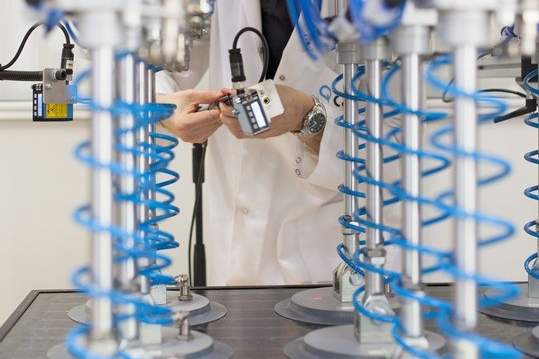The need for more comprehensive PV module testing and certifications is growing, and TÜV Rheinland’s answer is a new Quality Controlled PV testing standard that raises the bar in terms of monitoring, testing and recognizing solar module quality. The group confirmed this week that Q CELLS became the first solar module manufacturer in the industry to successfully complete and pass the stringent new module testing certification program. Not only that, but the Quality Controlled PV will become the Q CELL’s official certification standard, beginning with its latest range of Q.PEAK DUO-G9+ solar modules.
This is a testing scheme that is not only the most extensive and stringent available to date, but is also the only certification in the entire industry to involve independent and random onsite testing from running production, as well as regular material testing.
Why it matters. The TÜV Rheinland certification process takes into account recent failure modes in solar, and has thus been designed to set a new standard of quality parameters for the entire industry. Vitally, the Quality Controlled PV program will be dynamic and regularly updated as and when new testing standards are approved – thus ensuring that not only does the program set the bar for quality, it continues to raise it, too.
How it happened. Q CELLS invited TÜV Rheinland to work closely with its quality management experts at Europe’s largest solar testing facility, at Q CELLS’ Technology and R&D Headquarters in Thalheim, Germany. This collaborative effort paired the unique experience of Q CELLS’ quality management and R&D staff with TÜV Rheinland’s industry experts, and the result is a completely independent testing and certification program from TÜV Rheinland that is the only program on the market to continuously monitor product quality and durability in mass production.
“TÜV Rheinland has defined a catalogue of tests that establish additional qualities that go beyond the standard level of approval and safety qualification,” said Lukas Jakisch, Business Field Manager for PV modules at TÜV Rheinland. “TÜV Rheinland’s surveillance of a manufacturer’s production process – where we perform tests on samples taken at random every month – seeks to identify a consistent level of oversight, with a special focus on reliability and material properties as well as supplier change control.”
How it works. The three-component Quality Controlled PV certification process introduces a completely new set of uniquely stringent testing standards. Component one is the initial qualification test, which assesses long-term reliability by applying testing durations that are up to three-times longer than standard IEC and UL tests (including 2,000 hours damp heat testing, which is twice that of the IEC/UL, and 600 thermal cycles – three times that of the IEC). Augmenting these extended tests are additional durability tests that cover failure modes not included in standard IEC certification, such as weathering durability of backsheets, and long-term stability of solder bonds. Further testing measures include an extended stress test for mechanical load, PID (potential induced degradation), LeTID (light and elevated temperature induced degradation) and UV resistance of the backsheet.
Component two of the Quality Controlled PV testing process is what really sets it apart from all previous standards. Here, independent TÜV Rheinland representatives are located onsite at module manufacturing facilities to select samples for testing from the running production. This component ensures that a module manufacturer’s mass production processes are continuously and thoroughly tested, with random sampling at regular intervals conducted by the fully independent TÜV Rheinland personnel.
The third and final component is the regular monitoring of the materials and suppliers used by manufacturers. Here, TÜV Rheinland experts monitor supplier audits, and material footprint analysis of materials regularly used. Continuous monitoring of these materials during mass production, on both a monthly and a more regular basis, assesses if the structure and composition of the materials used remains of consistently high quality. TÜV Rheinland and Q CELLS are convinced that this material inspection component shall become standardized in the PV industry.
“We continue to conduct and develop a number of additional test programs in parallel – each designed to deliver and ensure improvements in solar module quality,” says Nicole Nelles, Head of Q CELLS Global Quality Management. “The aim is to integrate them into the Quality Controlled PV program so that it is continuously evolving with the times. We have set the industry standard, and we want to maintain that standard moving forward.”
— Solar Builder magazine

Leave a Reply
You must be logged in to post a comment.